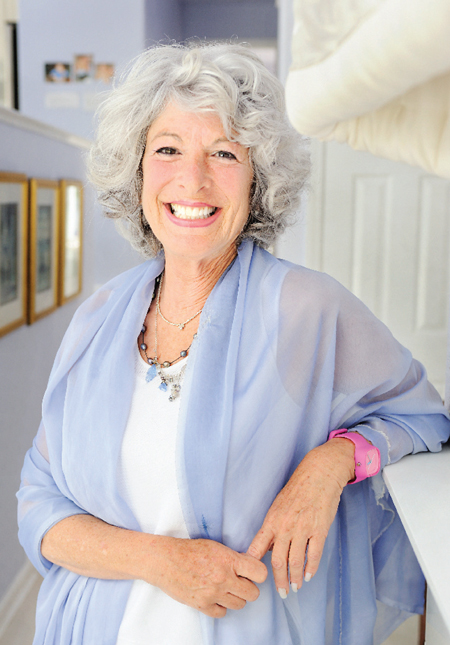"I’m not a person who goes to doctors,” says Nancy Novack. But on April 29, 2004, the 65-year-old thought she was having an appendicitis attack. After rushing to the hospital and getting a CAT scan, she learned there was a tumor in her ovary the size of a grapefruit, and the problem had spread to the liver. “It was a dark day when this all happened,” Novack recalls. That same day she was diagnosed with Stage 4 cancer.
While at Stanford receiving treatment, she was haunted by the sight of other patients suffering all by themselves during such a difficult time. “It was hard to see the sadness that comes from the people who are alone; even the nurses would say (to me), ‘It was such a joy when you came in (for treatment) and would bring food and friends.’ I was really lucky I never had to be alone.”
The high cost of treatment, even with insurance, was also startling: “I had a fancy PPO, but it didn’t cover all expenses.” To boost her white cell count high enough to withstand 21 rounds of chemotherapy, she had to give herself a shot each day, but her insurance didn’t pay for self-administered procedures. People who don’t have money to do it, they might not live, Novack says. “Who’s going to pay for it? Or when it’s over and the debt piles up, the financial end of it can be extraordinary.”
She decided she wanted to help, so she met with Linda Campbell of the American Cancer Society. They decided that what was missing in Marin—a need that wasn’t being addressed by the many agencies that deal with cancer in the county—was a central resource, a primary place where cancer sufferers seeking information could turn. A project that would involve the entire community’s participation.With Campbell’s support, Novack started researching, and Nancy’s List was born.
The website, nancyslist.org, features financial information, a calendar with events like yoga classes for cancer patients, a bulletin board where members can seek or find assistance like rides to treatment, and a resource list for information about cancer. The site accepts donations, through Google Checkout, to meet needs like building up the section of the site geared to teens. “If money were no object, I’d make (the site) bigger, take it into the city,” Novack says.
Novack, who is now cancer-free is also a practicing clinical psychologist, and fields phone calls day and night from people dealing with cancer, some from as far away as London. “Doctors don’t have time to listen to you at two in the morning. I’d like to be able to do that. A 76-year-old woman who was being treated in New York, we talked every day for eight months and she said there was no one in her life she could talk to. When I got diagnosed I wanted a therapist who had cancer and I never found one.”
Dr. Karin Gaensler, a UCSF clinical professor of hematology/oncology and a friend of Novack’s, applauds her efforts. “She’s articulate and her life experience validates what she says and how she approaches things. She’s an extraordinary person who has turned this catastrophic event into something that has enormous positivity.”
What’s needed now for Nancy’s List, she says, are more resources—someone else to run the phones and devise an e-mail setup and a donor structure. “In Marin we assume that everyone has good health insurance and a support system,” Gaensler adds. “In fact, that is not the case.”
Even with inadequate funds, Novack is determined to keep Nancy’s List alive. “I’m thrilled with this project, but I’m (also) thrilled with what it says about the community we live in. For me, (this ordeal) can be a very transforming time, but it takes a village. We need to be working together for these people.”


